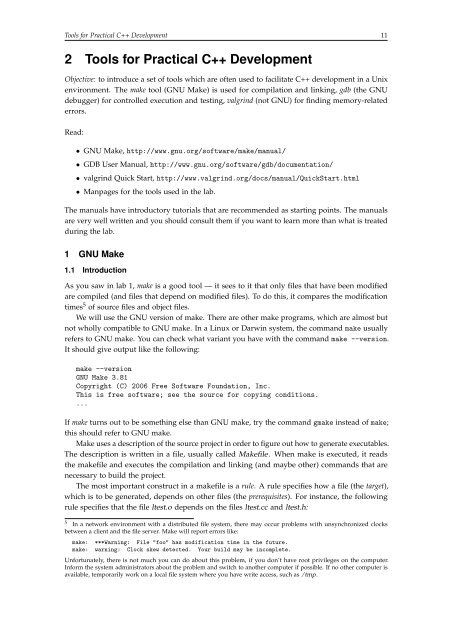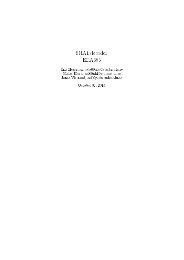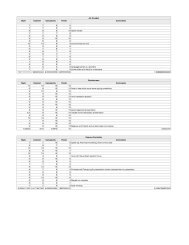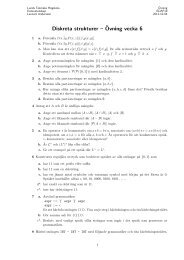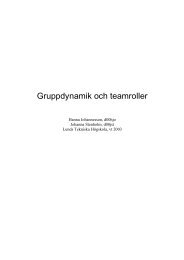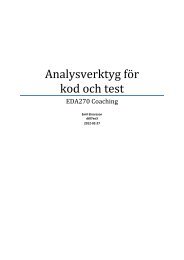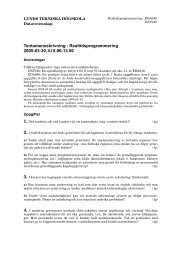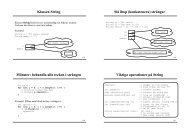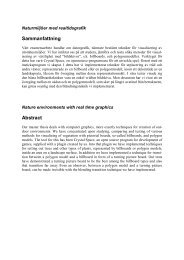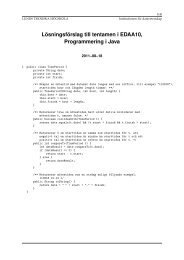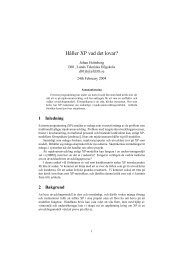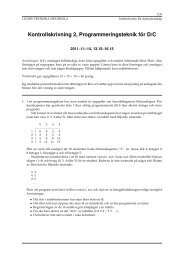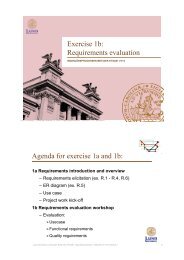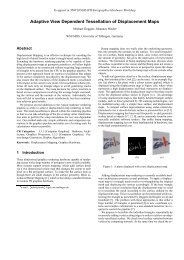Laboratory Exercises, C++ Programming
Laboratory Exercises, C++ Programming
Laboratory Exercises, C++ Programming
Create successful ePaper yourself
Turn your PDF publications into a flip-book with our unique Google optimized e-Paper software.
Tools for Practical <strong>C++</strong> Development 11<br />
2 Tools for Practical <strong>C++</strong> Development<br />
Objective: to introduce a set of tools which are often used to facilitate <strong>C++</strong> development in a Unix<br />
environment. The make tool (GNU Make) is used for compilation and linking, gdb (the GNU<br />
debugger) for controlled execution and testing, valgrind (not GNU) for finding memory-related<br />
errors.<br />
Read:<br />
• GNU Make, http://www.gnu.org/software/make/manual/<br />
• GDB User Manual, http://www.gnu.org/software/gdb/documentation/<br />
• valgrind Quick Start, http://www.valgrind.org/docs/manual/QuickStart.html<br />
• Manpages for the tools used in the lab.<br />
The manuals have introductory tutorials that are recommended as starting points. The manuals<br />
are very well written and you should consult them if you want to learn more than what is treated<br />
during the lab.<br />
1 GNU Make<br />
1.1 Introduction<br />
As you saw in lab 1, make is a good tool — it sees to it that only files that have been modified<br />
are compiled (and files that depend on modified files). To do this, it compares the modification<br />
times 5 of source files and object files.<br />
We will use the GNU version of make. There are other make programs, which are almost but<br />
not wholly compatible to GNU make. In a Linux or Darwin system, the command make usually<br />
refers to GNU make. You can check what variant you have with the command make --version.<br />
It should give output like the following:<br />
make --version<br />
GNU Make 3.81<br />
Copyright (C) 2006 Free Software Foundation, Inc.<br />
This is free software; see the source for copying conditions.<br />
...<br />
If make turns out to be something else than GNU make, try the command gmake instead of make;<br />
this should refer to GNU make.<br />
Make uses a description of the source project in order to figure out how to generate executables.<br />
The description is written in a file, usually called Makefile. When make is executed, it reads<br />
the makefile and executes the compilation and linking (and maybe other) commands that are<br />
necessary to build the project.<br />
The most important construct in a makefile is a rule. A rule specifies how a file (the target),<br />
which is to be generated, depends on other files (the prerequisites). For instance, the following<br />
rule specifies that the file ltest.o depends on the files ltest.cc and ltest.h:<br />
5 In a network environment with a distributed file system, there may occur problems with unsynchronized clocks<br />
between a client and the file server. Make will report errors like:<br />
make: ***Warning: File "foo" has modification time in the future.<br />
make: warning: Clock skew detected. Your build may be incomplete.<br />
Unfortunately, there is not much you can do about this problem, if you don’t have root privileges on the computer.<br />
Inform the system administrators about the problem and switch to another computer if possible. If no other computer is<br />
available, temporarily work on a local file system where you have write access, such as /tmp.


